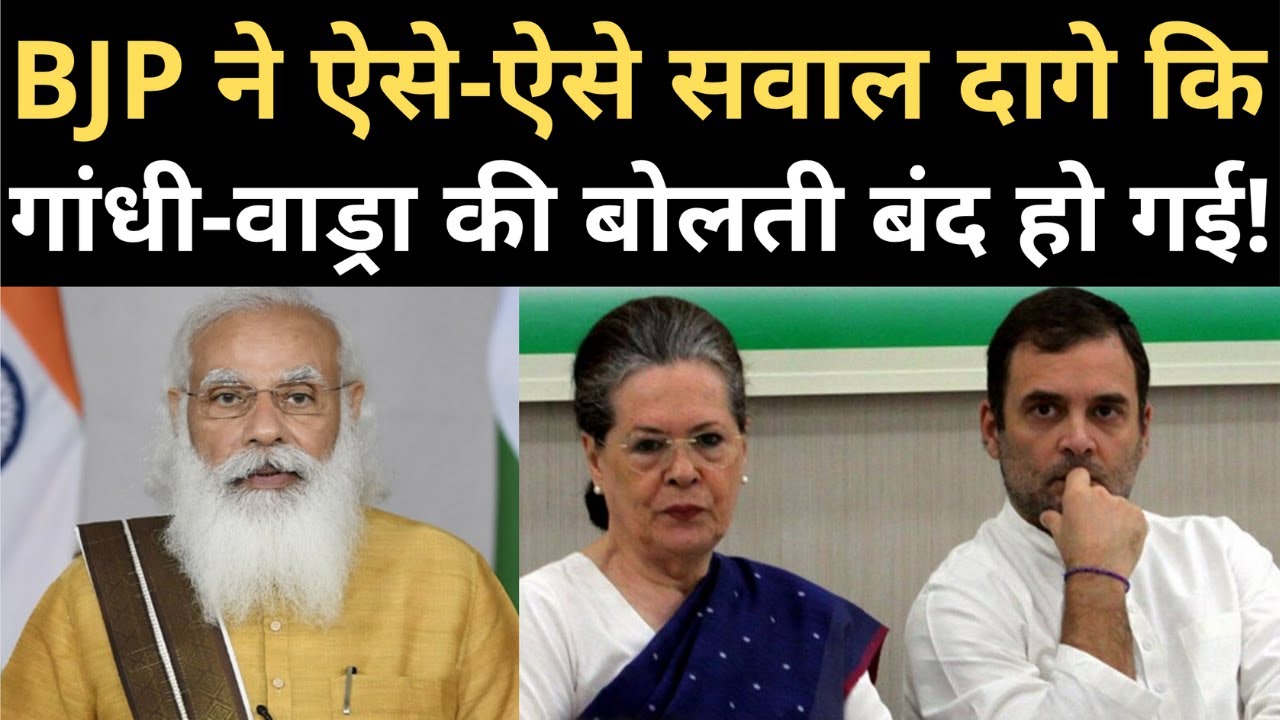


The BJP has accused the Congress of seeking foreign help to discredit the SEBI chief and destabilize India's financial markets. This comes after US-based Hindenburg Research made allegations against SEBI Chairperson Madhabi Puri Buch. While the BJP calls for Buch's resignation, the party also questions the Congress' motives and accuses them of playing a role in damaging India's credibility.
Hindenburg Report and the Political Storm
Background:
Hindenburg Research, a US-based short-selling firm, released a report in January 2023 alleging financial irregularities and stock manipulation at Adani Group, a conglomerate led by Indian billionaire Gautam Adani. The report triggered a massive sell-off in Adani Group shares, wiping out billions of dollars in market value.
BJP's Allegations:
The Bharatiya Janata Party (BJP), India's ruling party, has accused the Congress of colluding with Hindenburg Research to defame the Securities and Exchange Board of India (SEBI) chief, Madhabi Puri Buch. The BJP alleges that the Congress is trying to discredit Buch because she is investigating Adani Group.
The BJP has also questioned the motives of Hindenburg Research, suggesting that its report is part of a larger conspiracy to destabilize India's financial markets.
Congress' Response:
The Congress has denied the allegations, calling them "baseless and politically motivated." The party has accused the BJP of trying to distract attention from the Adani controversy by blaming the opposition.
Investigation and Controversies:
SEBI has launched an investigation into the allegations against Adani Group. The Adani Group has denied any wrongdoing and has pledged to cooperate with the investigation.
However, the allegations have raised questions about the independence and effectiveness of SEBI. Some critics have accused SEBI of being too lenient with Adani Group in the past. Others have questioned the timing of the Hindenburg report, which was released just before the Adani Group's planned $2.5 billion follow-on public offering (FPO).
Top 5 FAQs and Answers:
Q1. What is the Hindenburg Report?
A. The Hindenburg Report is a research report by Hindenburg Research that alleges financial irregularities and stock manipulation at Adani Group.
Q2. What are the allegations against Adani Group?
A. The allegations include related-party transactions, undisclosed leverage, and stock manipulation.
Q3. What is the BJP's role in this controversy?
A. The BJP has accused the Congress of colluding with Hindenburg Research to discredit SEBI and destabilize India's financial markets.
Q4. What is the Congress' response to these allegations?
A. The Congress has denied the allegations and accused the BJP of trying to distract attention from the Adani controversy.
Q5. What is the status of SEBI's investigation?
A. SEBI has launched an investigation into the allegations against Adani Group. The investigation is ongoing.

Ranjana Sonawane, the first recipient of India's Aadhar card, still lacks access to government schemes 13 years later. Despite being eligible for the Chief Minister Majhi Ladki Behen Yojana, Ranjana has not received any money due to an issue with her Aadhar being linked to someone else's bank account. This case brings to light the flaws in the implementation of government schemes in rural and tribal areas, where women like Ranjana often have their funds misdirected or lack necessary information.

The Indian National Congress (INC) has announced its plans to launch a month-and-a-half-long campaign in Jammu and Kashmir on April 22. The purpose of the campaign is to demand the restoration of statehood and to further the “Save the Constitution” movement. With the recent appointment of Syed Naseer Hussain as the new J&K in-charge, the party hopes to regain its lost support in the Union Territory. This campaign comes at a crucial time, as former supporters of the Congress leader Ghulam Nabi Azad have recently dissolved their party, raising questions about their political future. The Congress hopes to use this opportunity to highlight the BJP's failures in empowering elected governments and its betrayal over statehood.

Thousands of citizens in Pune are rallying together through an online petition to demand the protection of their city's hills and hill slopes from any construction. The petition is addressed to the former Pune Municipal Commissioner and Chairman of the state-appointed Committee on Bio-Diversity Park and Hill Top Hill Slopes. The citizens are concerned that the committee's review may result in allowing construction on the hills, while strict measures have already been mandated by the government to prevent it. The citizens stress the importance of preserving these natural areas for the city's ecological balance and urge the government to uphold its promise to future generations.

After the devastating terror attack in Pahalgam, Jammu and Kashmir, India has suspended the 1960 Indus Waters Treaty with Pakistan. This decision was made during a key meeting chaired by Union Home Minister Amit Shah, with discussions on potential actions being taken against Pakistan. As tensions between the two countries continue to escalate, Indian leaders have condemned Pakistan for their involvement in the attack and have vowed to take strong measures in response.

The Indian Army made its first major move since the Pahalgam terror attack on April 22, as they killed top Lashkar-e-Taiba (LeT) commander Altaf Lalli in an encounter in Jammu and Kashmir's Bandipora district. The security forces are on the hunt for the terrorists responsible for the brutal killing of 26 civilians and have launched a massive anti-terror operation. In other developments, Indian Army Chief General Upendra Dwivedi visited Srinagar for a security review meeting and the authorities demolished the houses of two suspected terrorists involved in the Pahalgam attack.

In a hearing at the Supreme Court, the bench rebuked Congress leader Rahul Gandhi for his "irresponsible" comments about freedom fighter Vinayak Damodar Savarkar. The judges highlighted the need to show respect for India's freedom fighters and questioned whether Gandhi was aware of his grandmother and Mahatma Gandhi praising Savarkar. The court also stayed an Allahabad High Court order that refused to dismiss a lower court's summons against Gandhi over his alleged remarks about Savarkar.

The Supreme Court has stepped in to warn Congress MP Rahul Gandhi over his comments about India's independence activist Veer Savarkar, staying a trial court's summons to the politician. The top court emphasized that Savarkar is a highly respected figure in Maharashtra and stated that no one would be allowed to make derogatory remarks about freedom fighters. The court also pointed out that Gandhi's family has had a history of praising Savarkar and Gandhi himself has been warned that the court will take suo motu cognizance of any such remarks. Additionally, the article also mentions an attack in Jammu and Kashmir that has led to heightened tensions between India and Pakistan.

In a successful operation by the security forces, a Lashkar-e-Taliba (LeT) terrorist associate, identified as Altaf Lalli, was killed in an ongoing encounter in the Bandipora district of Jammu and Kashmir. The encounter began after the security forces received intelligence about the presence of terrorists in the area. Two security personnel have also been injured in the exchange of fire and are currently undergoing treatment at a nearby hospital. The clash highlights the continued efforts of the security forces to combat terrorism in the region.

The Telangana-Chhattisgarh border is a hotbed of tension as security forces step up their efforts to root out Maoist activity from the region. Top Maoist leader Hidma is the target of current high-security operations, with forces strategically advancing through previously inaccessible areas. With mounting pressure, sources indicate that the hold of the Maoists in the region is gradually weakening, making for a tense and critical situation.

As the nation grapples with the aftermath of a terror attack in Pahalgam, security forces are undertaking a massive operation in the dense Karregutta hills forest to eliminate the heart of Naxal command. This operation, involving 7,000 personnel and cutting-edge technology, aims to strike a blow at Naxalism by targeting top leaders of the PLGA Battalion No. 1. This bold move by the CRPF, with the Director General personally overseeing the operation, marks a turning point in the fight against Maoist insurgency. With five Naxals already killed and more likely to come, the operation is being hailed as a decisive victory and could potentially spell the end of Naxalism in India.